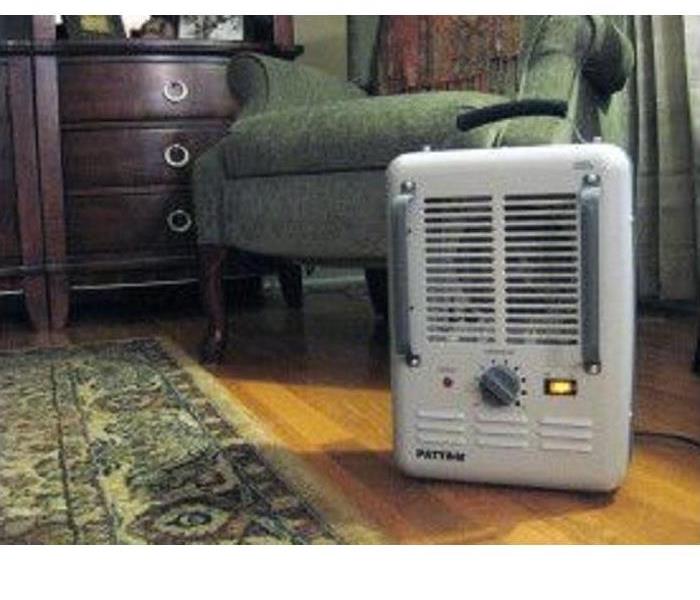Recent Fire Damage Posts
More Tips on Fire Prevention During the Holidays
12/16/2020 (Permalink)
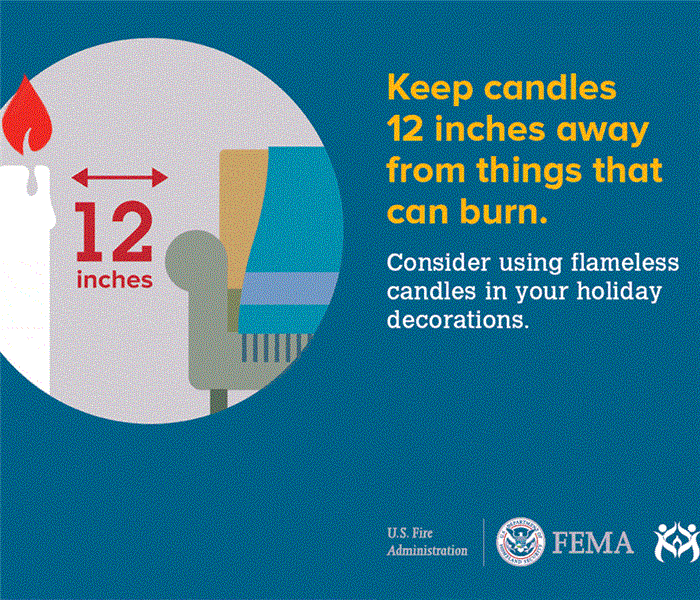 Keep candles safely away from flammable objects, such as furniture, curtains, or decorations.
Keep candles safely away from flammable objects, such as furniture, curtains, or decorations.
While it's always important to be fire smart around your home, the team at SERVPRO of Glenview would like to gently remind you to be extra-cautious when decking out your home for the holidays.
Be aware of any fire dangers that may be present at this time, from holiday lights and decorations to your tree, from a crowded kitchen stovetop to lit candles in your home.
In today's blog post, we're focusing on fire prevention and fire safety tips that are important to remember not only during the holidays, but the whole year through.
Take a look around your home as you prepare to entertain guests during the holidays. There may be fire hazards you overlook simply because you live there and don't "see" them. More than half of home decoration fires in December are started by candles, so pay close attention to candles in your home!
- Keep candles and melted wax warmers out of reach of small children and pets.
- Pay special attention to the power cords for melted wax warmers to ensure they do not dangle or lay where they can be accidentally tripped over or snagged and knock the warmer over.
- When candles are lit, ensure they are not near any flammable objects, such as decorations, curtains, or greeting cards.
- Keep matches and lighters out of reach of children.
- Stay in the kitchen when cooking on the stovetop. Keep a watchful eye in case someone lays an oven mitt or dishtowel near the stove where it may catch fire.
- Test your smoke alarms before guests arrive and have a fire extinguisher accessible to the kitchen (and fireplace, if you have one and will be using it). If you haven't replaced the batteries in your smoke alarms when you reset the clocks last month, now would be a very good time to replace batteries!
- Blow out all candles and turn off all lights and decorations, both indoor and outdoor, before you go to bed. Note, electrical decorations as well as battery-powered ones should be unplugged or turned off.
- Ask smokers to smoke outside; provide deep ashtrays with a bit of water so butts can be extinguished before guests return indoors.
- Remember that, while nostalgic and picture-perfect, lighting real candles on your Christmas tree is an extreme fire hazard.
The National Fire Prevention Association works to educate the public about potential fire risks during the holidays, offering tip sheets, videos, and other resources. Learn more by visiting their website.
If the unthinkable should happen and you have a fire in your home during the holidays, know that you can call on SERVPRO® of Glenview to help clean up the fire and smoke damage. We are available 24/7/365 - call us at 847-832-9300.
How to SAFELY Deck the Halls this Holiday Season
12/9/2020 (Permalink)
While it's always important to be fire smart around your home, the team at SERVPRO of Glenview would like to gently remind you to be extra-cautious when decking out your home for the holidays.
Be aware of any fire dangers that may be present at this time, from holiday lights and decorations to your tree, from a crowded kitchen stovetop to lit candles in your home.
In today's blog post, we're focusing on fire prevention and fire safety when decorating for the upcoming holidays.
Your Christmas tree should bring joy and happiness to your home during the holidays; it should not be the cause of disaster or fire. These guidelines apply if you have an artificial tree, but additional precautions must be taken if you have a live tree.
- Never let your live tree dry out! Always keep it watered!
- Make sure your tree is at least 3ft away from any heat source
- Make sure your tree is not blocking an exit
- NEVER use or light candles on your tree!
- Inspect the lights you use to decorate your tree. 1 in every 4 home Christmas tree fires is caused by electrical problems.
- Holiday decorations come in all sorts of shapes and sizes and are used both indoors and outside. Be smart about choosing your holiday decorations, as well as where you place them.
- Choose flame-resistant or flame-retardant decorations whenever possible
- Use only UL approved, outdoor-rated lights when decorating the outdoors
- Use appropriate means of hanging your lights; for instance, use plastic clips, not metal nails
- Keep decorations away from windows and doors which are opened and closed frequently
- Be sure you don't overload your electrical circuit or connect too many strings of lights
- Replace damaged, worn, or old strings of lights and decorations. If possible, replace them with LED strings, as these pose less of a fire hazard.
- Unplug the strings of lights on a live tree right after the Christmas holiday, to minimize the chance that your drying tree catches an electrical spark and ignites.
- Lastly, dispose of your live tree as soon as it begins to dry out.
Look for more tips on holiday fire safety in our upcoming blog posts!
The National Fire Prevention Association works to educate the public about potential fire risks during the holidays, offering tip sheets, videos, and other resources. Learn more by visiting their website: http://bit.ly/2DXIx5Q
If the unthinkable should happen and you have a fire in your home during the holidays, know that you can call on SERVPRO® of Glenview to help clean up the fire and smoke damage. We are available 24/7/365 - call us at 847-832-9300.
Celebrate Safely This Holiday Season
11/17/2020 (Permalink)
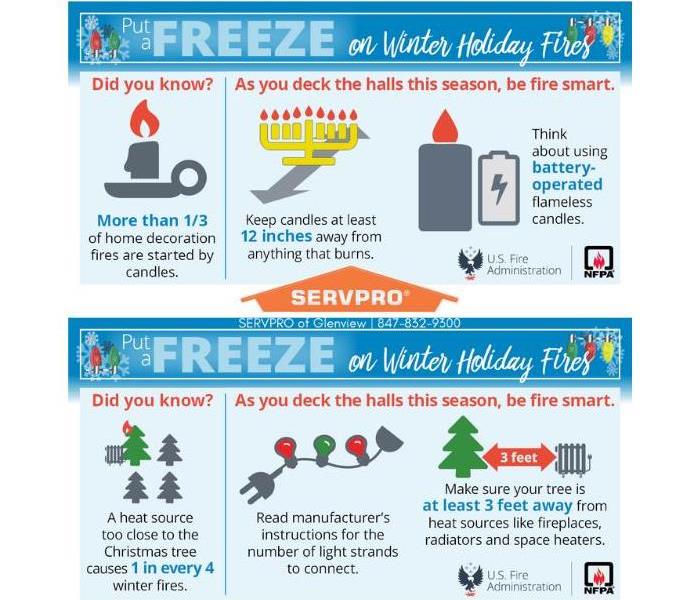 Put a Freeze on Winter Holiday Fires with these tips from the U.S. Fire Administration
Put a Freeze on Winter Holiday Fires with these tips from the U.S. Fire Administration
In a year when large holiday gatherings may not be possible, fire damage restoration specialist Jeff Thompson of SERVPRO of Glenview says a focus on family decorating traditions and more intimate celebrations may take on extra significance. "It's as important to keep safety top of mind with a small family gathering as it is with a large holiday party," says Thompson. "We all enjoy bringing the glow of the holiday season to our homes with Christmas trees or menorahs and candlelight, but these statistics from the US Fire Administration show how easy it is for home decorating to turn into a home disaster."
The top three days for home candle fires are Christmas Day, New Year's Day, and New Year's Eve.
In addition to exercising caution with candles and heat sources, it is important to follow manufacturers' guidelines for holiday lighting, says Thompson. "According to the National Fire Protection Association, electrical distribution or lighting equipment was involved in 44% of home Christmas tree fires. Though Christmas tree fires may not be common, they can be devastating to more than the house itself. They can destroy irreplaceable photos, mementos, and family heirlooms, and may even cost lives," says Thompson. "To help keep your holidays bright and your home and family safe, use common sense with candles and tree placement, and follow these important home decorating guidelines."
Only use decorations that are flame-retardant or non-flammable.
"In a year when so many of the things we take for granted have changed, we know people will still come together - in person or virtually - to celebrate family and holiday traditions," states Thompson. "'Stay safe' has become a common expression in the context of public health, but this holiday season, we urge all Glenview-area home and business owners to think about 'staying safe' as they prepare for and enjoy the upcoming holiday season."
SERVPRO is an industry leader and provider of fire and water cleanup and restoration services. For more fire prevention and fire safety tips and information about fire and water damage restoration services, please visit www.SERVPROglenview.com. For more information on SERVPRO of Glenview, please contact our office at 847-832-9300.
Stay Warm and Stay Safe This Winter
11/9/2020 (Permalink)
As winter approaches, SERVPRO of Glenview would like to provide you with some safety tips on using space heaters and preventing the possibility of fire damage.
Our technicians understand that accidents happen. Using the wrong type of heater in a particular area can cause severe problems, as can placing space heaters too close to other objects. To avoid setting up a situation in your home which might lead to fire, consider the type and location of heater you purchase to use in your home.
Electric heaters are the most popular type of space heaters customers purchase and they are available in a variety of shapes and sizes. Electric space heaters can be useful in many areas of your home; however, they should never be left unattended. Make sure you have sufficient wattage to run the heating device without tripping the circuit. Always plug the heater directly into an outlet - NEVER use an extension cord. Also - never use an electric heater in a wet or moist environment, such as your bathroom or wet basement.
Oil heaters should be used where there is the possibility of moisture. This eliminates any electrical hazards that may be present due to water conductivity. Always keep a safe distance once the heater is running to avoid contact burns.
We highly recommend following these simple guidelines when operating your space heater:
- Always place space heaters on a dry, flat, solid surface for stabilization. Do not place on thick carpeting or other flammable surface.
- Purchase heaters with an automatic shut-off feature to prevent dangers which may occur from tipping.
- Maintain proper spacing between heaters and other objects in your home. Pay very close attention to the proximity between the heater and soft, flammable objects such as furniture including couches, chairs, beds, bedding, blankets, pillows, clothing, and even pet peds.
- Never leave children or pets unsupervised around operating heaters.
- Shut your heaters off properly before leaving your home or going to sleep. If you must use a heater at night, set it on a timer to turn off after a short time.
Following these guidelines means you are much less likely to have such a destructive consequence; however, this does not guarantee there won't be a fire. If a fire breaks out at your home or business this winter season, you should make 3 calls immediately: FIRST, CALL 9-1-1! Then call your insurance agent and start a claim. Then call SERVPRO of Glenview. We will respond quickly and provide you with the services you need to get your life back to normal fast.
Call SERVPRO of Glenview 24/7/365 at 847-832-9300
Grilling Fires Peak in July
6/23/2020 (Permalink)
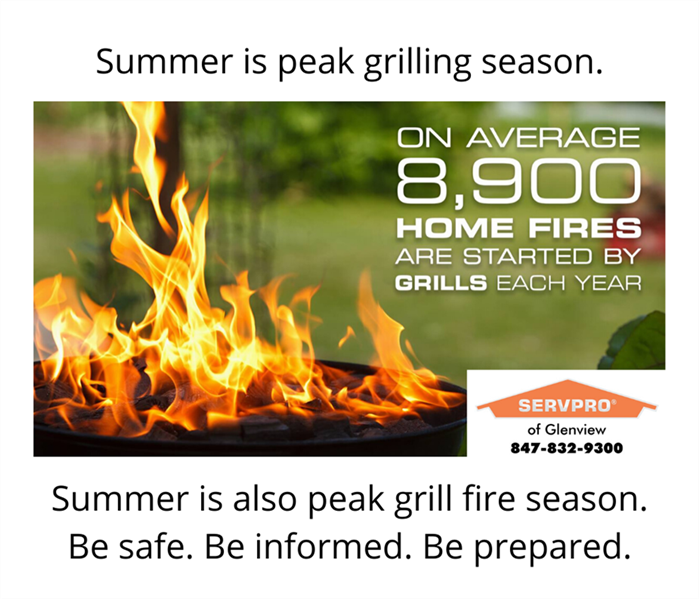 Be safe. Be informed. Be prepared. Grill safely!
Be safe. Be informed. Be prepared. Grill safely!
SERVPRO® Alerts Local Grill Masters: Grilling Fires Peak in July
Fire and water clean-up professionals offer Glenview and Northbrook area homeowners tips for safe outdoor cooking
The summer grilling season is here and outdoor cooking and socially-distanced picnic gatherings are a welcome change for families eager to get out and enjoy the warm weather. As families and friends prepare their next outdoor feast, Jeff Thompson of SERVPRO® of Glenview, a local fire and disaster remediation specialist, urges area property owners to keep in mind some sobering grilling fire facts from the National Fire Protection Association (NFPA).
- Gas grills, hibachis, and barbeques are involved in an average of nearly 9,000 home fires each year, including 3,900 structure fires and 4,900 outdoor fires. Charcoal and other solid-fueled grills contribute to another 1,300 home fires per year.
- An average of 19,700 patients each year visit emergency rooms because of injuring involving grills. Nearly half (9,500 or 48%) of the injuries are thermal burns from fire (about 4,300) and from contact with hot objects (about 5,200). Children under age five account for an average of 2,000 of those contact-type burns.
- July is the peak month for grill fires (18%), including both structure, outdoor, or unclassified fires, followed by June (15%), May (13%), and August (12%).
"According to the NFPA, three out of five households own a gas grill - and gas grills are the chief culprit in home grilling fires," says Thompson. "And while grill-related fires peak between May and August, nearly half of home grillers use their grills year-round." Thompson shares the following advice from the NFPA with Glenview-area homeowners to help ensure that the only smoke coming from their outdoor feast is from their grill - and not from a property fire.
All Grills
- Use your propane or charcoal grills OUTDOORS only! Place your grill away from your home or deck railings and out from under eaves and overhanging branches.
- Keep children and pets at least three feet away from the grill area. Never leave your grill unattended!
- Keep your grill clean. Remove a grease or fat buildup from the grills and in trays below the grill. Always make sure your gas grill lid is open before lighting it.
Propane Grills
- Check the gas tank hose for leaks before using it for the first time each year.
- If you smell gas while cooking, immediately get away from the grill and call the fire department. Do not move the grill.
- If the flame goes out, turn the grill and gas off and wait at least five minutes before re-lighting it.
Charcoal Grills
- A charcoal chimney uses newspaper as a fuel to start the charcoal. If you use a starter fluid instead, use only charcoal starter fluid. If you use an electric charcoal starter, make sure to use an extension cord rated for outdoor use.
- Keep charcoal fluid out of the reach of children and away from heat sources. Never add charcoal fluid or any other flammable liquids to the fire once it is lit and going!
- When you are finished grilling, let the coals cool completely before transferring them to a metal container for disposal. NEVER throw coals or ash away without allowing them to cool completely!
"Even if no one is injured, a home fire is a devastating event. It can destroy not just property but priceless memories and create chaos in the aftermath," said Thompson. "Cleaning-up after a fire can feel overwhelming because it often involves smoke and water damage beyond the damage from the fire and flames. While we hope that these guidelines will help Glenview-area homeowners have a safe, fire-free grilling season, accidents can and do happen. If you do experience a structure fire, our SERVPRO®-trained professionals can help you get on the road to normal by managing clean-up efforts and helping with insurance and recovery. When disaster strikes, our goal, as always, is to make it seem "Like it never even happened."
SERVPRO® specializes in fire and water cleanup and restoration services and repair services, helping to remediate danger for both commercial and residential customers. For more information on SERVPRO® of Glenview, please contact Jeff Thompson at 847-832-9300. For more information on SERVPRO, please view our services on our home page, www.SERVPROglenview.com.
Resources: https://www.nfpa.org/grilling and https://www.nfpa.org/-/media/Files/Public-Education/Resources/Safety-tip-sheets/Grilling_safety_Tips.pdf
Holiday Decorations and Fire Safety
12/9/2019 (Permalink)
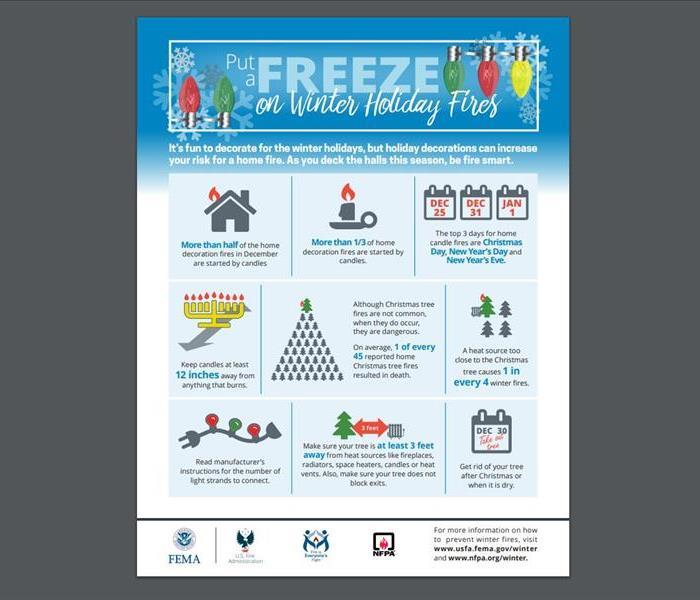 "Put the Winter Freeze on Holiday Fires", presented by the US Fire Administration (USFA) and the National Fire Protection Association (NFPA)
"Put the Winter Freeze on Holiday Fires", presented by the US Fire Administration (USFA) and the National Fire Protection Association (NFPA)
Be fire smart this December by taking precautions as you decorate your home for the holidays!
Residential fire damage in the winter months most commonly occurs because fire safety was ignored - either with holiday decorations throughout the home, or with cooking in the kitchen.
We've recently blogged about "Fire Safety During the Holidays" because Thanksgiving Day, Christmas Day, and Christmas Eve rank as the top three peak days when firefighters respond to home cooking fires. To read more about home cooking fire safety, read this blog post: http://bit.ly/191125blog
In this post, we'd like to remind folks how to be fire smart when decking out your home for the holidays. Be aware of any fire dangers that may be present during this time, specifically looking at your Christmas tree, your holiday decorations, and your home.
Your Christmas tree should bring joy and happiness to your home during the holidays; it should not be the cause of disaster or fire. These guidelines apply if you have an artificial tree, but additional precautions must be taken if you have a live tree.
- Never let your live tree dry out! Always keep it watered!
- Make sure your tree is at least 3ft away from any heat source
- Make sure your tree is not blocking an exit
- NEVER use or light candles on your tree!
- Inspect the lights you use to decorate your tree. 1 in every 4 home Christmas tree fires is caused by electrical problems.
- Lastly, dispose of your live tree as soon as it begins to dry out
Holiday decorations come in all sorts of shapes and sizes and are used both indoors and outside. Be smart about choosing your holiday decorations, as well as where you place them.
- Choose flame-resistant or flame-retardant decorations whenever possible
- Use only UL approved, outdoor-rated lights when decorating the outdoors
- Use appropriate means of hanging your lights; for instance, use plastic clips, not metal nails
- Keep decorations away from windows and doors which are opened and closed frequently
- Be sure you don't overload your electrical circuit or connect too many strings of lights
- Replace damaged, worn, or old strings of lights and decorations. If possible, replace them with LED strings, as these pose less of a fire hazard.
Take a look around your home as you prepare to entertain guests during the holidays. There may be fire hazards you overlook simply because you live there and don't "see" them. More than half of home decoration fires in December are started by candles, so pay close attention to candles in your home!
- Keep candles and melted wax warmers out of reach of small children and pets.
- When candles are lit, ensure they are not near any flammable objects, such as decorations, curtains, or greeting cards.
- Ask smokers to smoke outside; provide deep ashtrays with a bit of water so butts can be extinguished before guests return indoors.
- Keep matches and lighters out of reach of children.
- Stay in the kitchen when cooking on the stovetop. Keep a watchful eye in case someone lays an oven mitt or dishtowel near the stove where it may catch fire.
- Test your smoke alarms before guests arrive and have a fire extinguisher accessible to the kitchen (and fireplace, if you will be using one).
- Blow out all candles and turn off all lights and decorations, both indoor and outdoor, before you go to bed.
The National Fire Prevention Association works to educate the public about potential fire risks during the holidays, offering tip sheets, videos, and other resources. Learn more by visiting their website: http://bit.ly/2DXIx5Q
If the unthinkable should happen and you have a fire in your home during the holidays, know that you can call on SERVPRO® of Glenview to help clean up the fire and smoke damage. We are available 24/7/365 - call us at 847-832-9300.
#SERVPRO #SERVPROGlenview #firedamage #smokedamage #firesafetytips #cookingfire #nfpasafetytips #firesafety #homefire #nationalfireprotectionassociation #holidaysafety #homefiresduringtheholidays
Fire Safety During the Holidays
11/25/2019 (Permalink)
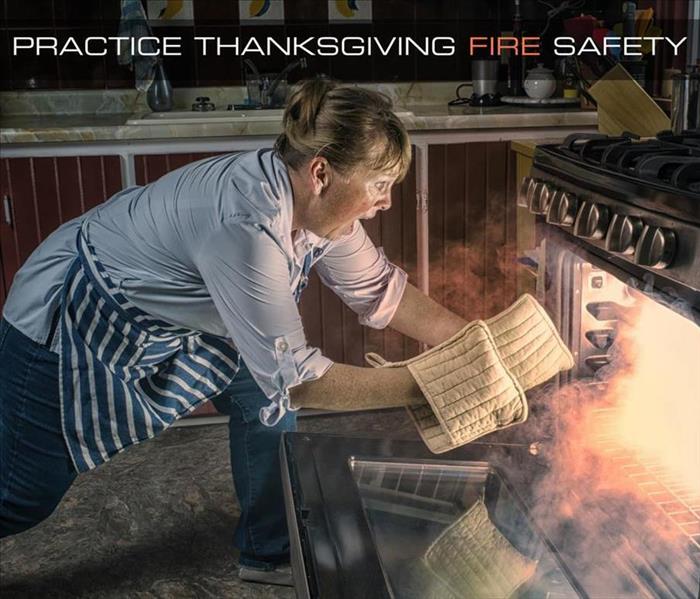 Thanksgiving is the peak day for home cooking fires. Practice fire safety
Thanksgiving is the peak day for home cooking fires. Practice fire safety
Did you know Thanksgiving Day is the peak day for home cooking fires?
Over the five years between 2013 and 2017, US Fire Departments responded to an estimated average of 173,200 home structure fires each year started by cooking activities, which averages about 470 home cooking fires per day.
However, on Thanksgiving Day, fire departments responded to an estimated 1,600 fires caused by home cooking activities!
Thanksgiving Day is the peak day for home cooking fires, followed closely by Christmas Day and Christmas Eve. Unattended cooking is by far the leading contributing factor in cooking fires and fire deaths, according to the NFPA (National Fire Protection Association).
Each year, fires cause an average of 550 civilian deaths, 5,020 reported civilian fire injuries, and over $1.2 Billion in direct property damage. Ranges or cooktops were involved in 62% of reported home cooking fires, in 89% of cooking fire deaths, and ini 79% of cooking fire injuries.
In most homes, the kitchen is the heart of the home and that is no different during the holidays. Young and old alike, family members gather in or near the kitchen during holiday meal preparations. As the activity and number of people increase in your home, especially in your kitchen, it is important to practice fire safety at all times.
Check out this NFPA page which provides not only the Top 10 Safety Tips for Thanksgiving Day, but also has great reminders for Cooking Safety (available to read online or to download and print).
https://www.nfpa.org/Public-Education/Fire-causes-and-risks/Seasonal-fire-causes/Thanksgiving
If the unthinkable should happen and you have a cooking fire in your home, know that you can call on SERVPRO® of Glenview to help clean up the fire and smoke damage. We are available 24/7/365 - call our office at 847-832-9300.
#SERVPRO #SERVPROGlenview #firedamage #smokedamage #cookingsafety #safetytips #thanksgivingdayfire #cookingfire #nationalfireprotectionassociation #nfpasafetytips #firesafety #homefire #homefireinjuries #homefiredeaths #holidaysafety
Brrr! It's COLD! Be smart about using space heaters!
11/12/2019 (Permalink)
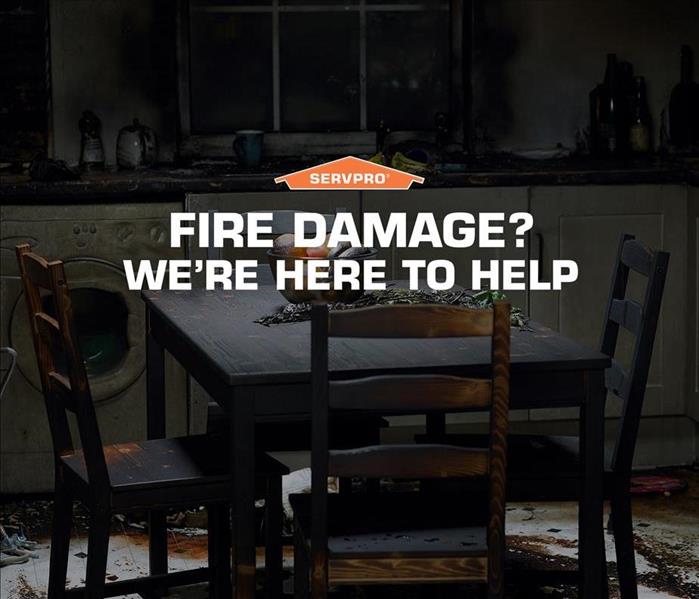 Call SERVPRO of Glenview at 847-832-9300
Call SERVPRO of Glenview at 847-832-9300
Fire does not follow a schedule, it doesn't care what season it is or whether it's cold outside. Fires are extremely common in the winter, because folks are trying hard to stay warm.
As we begin this winter season, SERVPRO of Glenview would like to provide you with some tips to avoid having to deal with the destructive aftermath of fire damage.
Our technicians understand that accidents happen. Using the wrong type of heater in a particular area can cause severe problems, as can placing space heaters too close to other objects. To avoid setting up factors in your home which could lead to fire, consider the type and location of heater you purchase to use in your home.
Electric heaters are the most popular type of heaters customers purchase and they are available in a variety of shapes and sizes. Electric space heaters can be useful in many areas of your home; however, they should never be left unattended. Thinking of electric heaters as giant toasters can help you understand how important it is to keep a constant eye on them. Make sure you have sufficient wattage to run the heating device without tripping the circuit. Always plug the heater directly into an outlet - NEVER use an extension cord. Also - never use an electric heater in a wet or moist environment, such as your bathroom.
Oil heaters should be used where there is the possibility of moisture. This eliminates any electrical hazards that may be present due to water conductivity. Always keep a safe distance once the heater is running to avoid contact burns.
SERVPRO gets an incredible number of calls relating space heaters every winter. People are trying to stay warm and use heaters as their source of heat. However, using a space heater does not need to cause so many problems during a cold spell. Use common sense and always follow the directions of the manufacturer.
Our professional technicians have the following simple guidelines to follow when operating your space heater:
- Always place space heaters on a dry, flat, solid surface for stabilization. Do not place on thick carpeting or other flammable surface.
- Purchase heaters with an automatic shut-off feature to prevent dangers which may occur from tipping.
- Maintain proper spacing between heaters and other objects in your home. Pay very close attention to the proximity between the heater and soft, flammable objects such as furniture including couches, chairs, beds, bedding, blankets, pillows, clothing, and even pet peds.
- Never leave children or pets unsupervised around operating heaters.
- Shut your heaters off properly before leaving your home or going to sleep. If you must use a heater at night, set it on a timer to turn off after a short time.
Following these guidelines does not guarantee that you will never have to deal with fire damage from space heaters. However, you are much less likely to have such a destructive an unwanted consequence. If this sort of incident still strikes your home or business this winter season, make the call to our office immediately. We will respond quickly and provide you with the services you need to get your life back to normal fast.
Call SERVPRO of Glenview at 847-832-9300
National Fire Prevention Week: Oct 6-12, 2019
10/8/2019 (Permalink)
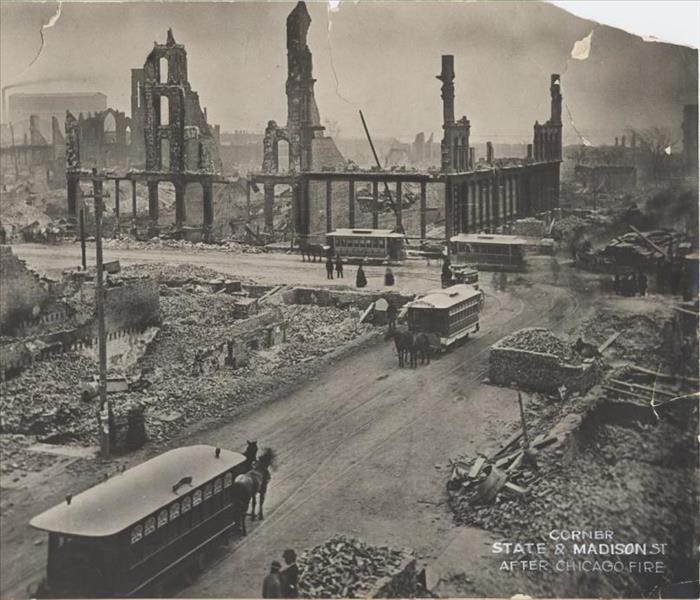 A photo showing the intersection of State and Madison Streets in which the utter destruction of the Great Chicago Fire can be seen.
A photo showing the intersection of State and Madison Streets in which the utter destruction of the Great Chicago Fire can be seen.
Every year, the second week of October is designated as National Fire Prevention Week, observed in the United States and Canada. This year, Fire Prevention Week is October 6th - 12th. On October 9th, 1920, President Woodrow Wilson issued the first National Fire Prevention Day proclamation. Since 1922, Fire Prevention Week has been observed on the Sunday through Saturday week in which October 9th falls. Beginning with President Calvin Coolidge in 1925, the U.S. President has signed a proclamation proclaiming a national observance during that week. Do you know why this week was chosen? It commemorates the Great Chicago Fire that burned from late in the evening of October 8th through October 10th, 1871. This fire destroyed roughly 3.3 square miles (2,124 acres) of the city of Chicago, claimed approximately 300 lives, and eliminated hundreds of businesses. More than 17,000 structures were destroyed and damages were estimated at close to $200 million (the equivalent of $3.77 Billion in 2016!). Nearly one-third of the city lay in ruins after the fire, and more than 100,000 residents were left without homes - fully one-third of the city's population of the time. This fire came to be known as the Great Chicago Fire and it remains the most famous and known fire in American history.
While the tragedy of the Great Chicago Fire stands as a great reminder of the importance of fire safety, few people know there were many other wildfires and brush fires that dry and drought-ridden second week of October 1871 in the Upper Midwest that caused great loss to both lives and property. The same day the fire in Chicago began, a fire broke out in upper northeast Wisconsin. America's most devastating forest fire scorched over 1.2 million acres of land. Sixteen towns were destroyed, the most damaged being Peshtigo, giving its name to this fire. The town of Peshtigo was consumed in an hour, with the fire claiming the lives of over 800 residents.
The damage estimate was at $169 million, nearly matching the cost of damage in Chicago. But the Peshtigo Fire claimed nearly four times the number of people than perished in Chicago. A Report to the Wisconsin Legislature in 1873 listed 1,182 names of deceased or missing residents following the Peshtigo Fire; in 1870, the town of Peshtigo had 1,749 residents. With deaths across the fire-damaged areas estimated between 1,500 and 2,500, the Peshtigo fire was the most costly fire of that week in terms of loss of lives, and it remains to this day as the deadliest fire in American history. Since local records were destroyed in the fire, an accurate death toll has never been determined. We are thankful to live in a time where we are not only taught fire safety and situational awareness, but we are better prepared to prevent or control such tragic and complete fire damage. If your home or business is damaged by fire, call SERVPRO® to help take back control of your life. We are available and ready to answer your call 24/7/365. Call us at (847) 832-9300. #GreatChicagoFire #PeshtigoFire #FireSafety #FireDamage #FireAwareness #SmokeDamage #SERVPRO #CleanupAndRestoration For more information, visit: https://www.nfpa.org/Public-Education/ARCHIVED/Fire-Prevention-Week-old/About-Fire-Prevention-Week
Put A Freeze on Winter Fires
12/4/2018 (Permalink)
 Stay safe this winter. Winter fires do happen.
Stay safe this winter. Winter fires do happen.
Heating, holiday decorations, winter storms and candles all contribute to an increased risk of fire during the winter months.
Heating
Heating is the second leading cause of U.S. home fires, deaths and injuries. December, January and February are the peak months for heating fires. Space heaters are the type of equipment most often involved in home heating equipment fires, figuring in two of every five fires (40%).
Carbon Monoxide
Often called the invisible killer, carbon monoxide (CO) is an odorless, colorless gas created when fuels such as gasoline, wood, coal, propane, etc. do not burn completely. In the home, heating and cooking equipment that burn fuel are potential sources of CO. Carbon monoxide incidents are more common during the winter months, and in residential properties.
Winter storms
Most of the U.S. is at risk for winter storms, which can cause dangerous and sometimes life-threatening conditions. Blinding wind-driven snow, extreme cold, icy road conditions, downed trees and power lines can all wreak havoc on our daily schedules. Home fires occur more in the winter than in any other season, and heating equipment is involved in one of every six reported home fires, and one in every five home fire deaths.
Generators
Portable generators are useful during power outages; however, many homeowners are unaware that the improper use of portable generators can be risky. The most common dangers associated with portable generators are carbon monoxide (CO) poisoning, electrical shock or electrocution, and fire hazards. According to a 2013 Consumer Product Safety Commission report, half of the generator-related deaths happened in the four coldest months of the year, November through February, and portable generators were involved in the majority of carbon monoxide deaths involving engine-driven tools.
Candles
December is the peak time of year for home candle fires; the top three days for home candle fires are Christmas, New Year’s Day, and New Year’s Eve. Each year between 2012 and 2016, an average of 8,200 home candle fires were reported each year.
Electrical
Electrical home fires are a leading cause of home fires in the U.S. Roughly half of all home electrical fires involved electrical distribution or lighting equipment, while nearly another half involved other known types of equipment like washer or dryer fans, and portable or stationary space heaters.
SERVPRO of Glenview wants you to be safe, but if this should happen to you, we can help! 847-832-9300
Using a Space Heater to Cozy Up Your Room? Just Take Care!
9/25/2018 (Permalink)
 Be Mindful When Using a Space Heater. Keep Your Home Safe.
Be Mindful When Using a Space Heater. Keep Your Home Safe.
It's getting to be that time of the year where a space heater seems like the perfect appliance to make a room a little cozier.
Fire does not care what season it is or whether or not it’s cold outside. Cold weather related fires are extremely common, especially when you are trying to keep warm.
Our offices in Glenview have experience in fire damage from space heaters and can provide you with some tips to help avoid having to deal with these types of destructive events this coming Autumn and Winter.
SERVPRO of Glenview technicians understand that accidents happen. Placing space heaters too close to other objects or using the wrong type of heater in a particular area can cause severe problems. Please take a moment to consider some factors leading to these fires.
Oil Heaters - Should be used in areas where there is the possibility of moisture. This eliminates any electrical hazards that may be present due to water conductivity. Always keep a safe distance to avoid contact burns.
Electric Heaters - These heaters come in a variety of shapes and sizes and can be useful for many areas in your home. However, they should never be left unattended. Thinking of electric heaters as giant toasters can help you understand how important it is to keep a constant eye on them. Make sure you have sufficient wattage to run the device and never use extension cords.
Our SERVPRO of Glenview staff gets an incredible amount of space heater-related calls every year when the weather gets to get chilly and blustery. People are trying to stay warm and use space heaters quite often for this purpose. However, using a space heater does not need to cause so many problems during a cold spell. Just use common sense, and always follow the directions of the manufacturer.
The professional technicians at SERVPRO of Glenview state that you follow a few simple guidelines when operating your space heaters.
1) Always place space heaters on a flat, solid surface for proper stabilization.
2) Purchase heaters with an automatic shut-off feature to prevent dangers from tipping.
3) Maintain proper spacing between heaters and other objects in your home.
4) Never leave children or pets unsupervised around operating heaters.
5) Shut your heaters off properly before leaving your home or going to sleep.
Following these guidelines does not ensure that you will never have to deal with fire damage from space heaters. However, you are less likely to have an unwanted consequence. If this sort of incident still strikes your home this cold weather season, make the call to our offices at 847-832-9300 immediately. We will respond quickly and provide you with the services you need to get back to normal fast.
Keep Your Home Safe From Fire!
9/17/2018 (Permalink)
 Prevent Your Home From Burning!
Prevent Your Home From Burning!
Accidental house fires remain a serious safety threat to homeowners, renters, and their families. Each year, roughly 3,400 people are killed in home fires or by burn injuries, making them the third-most-common cause of accidental deaths at home. Eight out of 10 fire-related deaths occur at home—the place that is the very embodiment of comfort and security.
Following are the most common ways that home fires ignite and provided a list of simple steps homeowners can take to prevent them.
Attention: In addition to the steps listed below, all households should have at least one smoke alarm on each floor and preferably in every bedroom. New smoke alarms should be installed every 10 years—and if you don't know how old your smoke alarm is, you should get a new one. Families should also plan and practice a home fire drill at least twice a year so that everyone in the house knows how to get outside fast in the case of a fire. If you don't already have one, the Home Safety Council has resources for creating such a plan available here.
Fire Threat 1: Cooking
Fire safety starts in the kitchen. Cooking—particularly stove-top cooking—represents the leading cause of home fires. Many such fires occur after residents put something on the stove but become distracted and forget about it. Solution: Stand by your pan. Because cooking causes so many home fires, it's essential to give anything that's on top of your stove has your undivided attention. If you have to leave the kitchen, turn the heat off [the burner] before you answer the phone or leave the room.
Fire Threat 2: Heating
The second-most-common cause of home fires is heating—although in the winter months, it becomes the leading concern. Portable, electric space heaters start a great deal of trouble, as sheets or window curtains accidentally come in contact with the unit and ignite.
Solution: Give heaters space People using space heaters should ensure that they are far enough away from other objects to avoid danger. A space heater needs 3 feet of clear space all around it in all directions, keeping it away from draperies, furniture, bedspreads, people, and pets. In addition, homeowners should have their central heating equipment professionally inspected and serviced each heating season. And if you regularly have logs burning in your fireplace, get your chimney inspected and cleaned annually as well.
Fire Threat 3: Smoking
In addition to its health dangers, smoking is the third-most-common cause of home fires—and the top cause of home fire deaths. Such fires can occur as smokers lose track of their still-smoldering butts, which then come in contact with flammable surfaces such as couch cushions.
Solution: Take it outside If you have a smoker in the house, the best way to prevent cigarette-related home fires is to institute a policy of no smoking indoors. Most people do not have as many combustible items around outside. In addition, cigarettes should be doused with water before they are thrown away to make sure they are completely extinguished.
Fire Threat 4: Electrical
Faulty or deteriorating electrical cords are another top cause of home fires. Cords that become frayed or cracked can send sparks to flammable surfaces and start a fire.
Solution: Cord checkup Check all of your electrical cords to ensure that they are in good shape, and replace any that are worn out. In addition, make sure you are not overloading circuits. It should be one plug per receptacle—you don't want that octopus thing going on.
Fire Threat 5: Candles
Since they have open flames and are fixtures in many households, candles are also among the most common sources of home fires.
Solution: Think about batteries Instead of using traditional, open-flame candles, consider switching to battery-operated candles that look and perform like real ones. If you do use traditional candles, make sure there is always an adult paying attention in the room when one is burning. (The flame should be extinguished when the adult leaves the room.) Get out of the habit of lighting a candle in a room and just leaving it burning. You are inviting disaster. Finally, candles should not be lit in your bedroom.
Fire's Out (YEAY)......Now the Real Work Begins
8/14/2018 (Permalink)
 Call us for help!
Call us for help!
Fire damage can be devastating for a homeowner. Aside from damaging the structure of the building, furniture, belongs etc., smoke and soot can continue to cause problems if not dealt with immediately. While everything that burned will have to be replaced, there are steps you can take to help prevent things from getting worse. First, you should seal off certain sections of your house with tarps and plastic sheets while damaged areas are being treated. Grease and soot can spread to other sections of the house, making everything worse. Odors can travel, and stains can get into your carpet, walls, and clothing. Blocking off the area can help prevent this.
Check for any leaks or other areas that could cause more problems for your home. Sometimes fire damages pipes, or there could be entry points for water in the roof. This can lead to water damage, which will only make things worse if it’s not treated right away. You can simply scan for any areas that might have this issue and keep an eye out for leaks if it rains. Moreover, you’ll need to watch out for mold and other problems that stem from water damage, as water used to extinguish fires can seep into dry wall and floors. Most often, carpet and flooring will need to be removed. These areas tend to absorb both soot and water, and it is usually much better to simply replace them. Essentially, everything that might have been covered in soot will need to be deep cleaned, and that includes clothing and other belongings that might have been damaged in the fire. Of course, some items will need to be replaced, but belongings that can withstand heavy cleaning can often be saved.
If the damaged area is not properly cleaned, the smoky odor that a fire leaves behind will never go away. There will always be at least a faint trace of that unpleasant smell. Sometimes, you can fix this problem by scrubbing the walls and floor with soap and water. Paint tends to hold odors, but if the damage is only on the surface and dealt with quickly, you might be able to get rid of it. However, sometimes these areas will need to be replaced depending on the severity of the damage. You’ll need to remove sections of drywall and perhaps even flooring. It can be difficult to tell the difference between things that can be salvaged and those that need to be replaced, but knowing will save you time and money. The professionals at SERVPRO of Glenview will be able to discern what can be restored, and they can help you effectively remove any traces of the fire while saving as much as possible. Give us a call today at (847)832-9300!
Preventing Summer Fires
7/10/2018 (Permalink)
 Summer brings a lot of fun, but it can also lead to dangerous fires getting out of hand
Summer brings a lot of fun, but it can also lead to dangerous fires getting out of hand
Thanks to the dry heat of summer and fun summer activities like campfires, people are at a slightly increased risk of fire-related injuries and deaths throughout the season. While fires are incredibly dangerous and should be taken seriously at all times, there are many simple ways that you can protect your home and family from suffering from the aftermath of a summer fire. Here are our best tips for preventing summer fires.
If your home is damaged by fire, We can help you make things right again. If you need us after the fire has done it's nasty work, call SERVPRO of Glenview at 847-832-9300.
Our Best Campfire Safety Tips
These fire tips should be explained to everyone gathering around the fire, whether they are six or sixty.
- Always follow the rules for the site you are camping at when it comes to lighting fires, extinguishing fires, and monitoring fires.
- If a piece of clothing catches on fire, practice stop, drop, and roll.
- Examine your surroundings when you are planning on starting a campfire. Choose an area where it will not spread. Stay away from dry leaves, grassy areas, or tree branches that are hanging overhead.
- Don’t store any lighter fluid or flammable liquids near your campfire, as stray flames can ignite them.
- Keep campfires away from any place you are sleeping including your home and your tent. Campfires should always be lit downwind from the tent. When choosing a tent, if you frequently make campfires, always choose one with flame-retardant materials.
- Never build large campfires or bonfires, even if they seem cooler when posted on social media.
- Always have one person stay with the campfire at all times while it was lit. Going to bed? Put it out!
- Keep plenty of water and a shovel near your campfire at all times to use in an emergency. Never light a campfire if you don’t already have a method of extinguishing it laid out and ready to go.
Our Best Fireworks Safety Tips
Fireworks are a ton of fun, but also a major safety hazard during the summer months.
- Only use legal fireworks.
- Always read the instructions on each firework before using.
- Never carry fireworks in your pocket.
- Don’t light fireworks on or near dry grass.
- Never wear loose-fitting clothes when handling fireworks.
Protecting Your Home and Family From Fires!
5/8/2018 (Permalink)
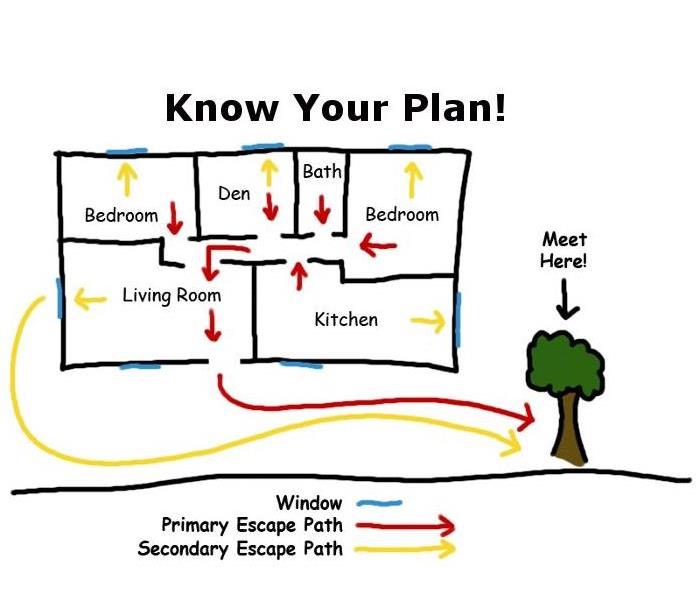 Know your escape plan!
Know your escape plan!
In the United States, there is a house fire reported every 90 seconds in 2016! That is a lot of fires! 85% of all fire related deaths occur in homes, so you should always be prepared! You may have seconds to minutes to escape a burning building because these fires can start and spread very rapidly.
First thing every homeowner should do, is install smoke alarms. They should be on every level and should be inside, or just outside every sleeping quarters. Make sure that they are interconnected, and tested every month. While smoke alarms are a great way to identify the danger, the best thing that can be done is to put a sprinkler system in your home. This may be a costly prevention method, but it can save your life and your property.
The next important piece of advice is to make an evacuation plan! Sit down with your family about twice a year and make sure everyone knows the quickest way out of your home. Make sure that there are two separate ways out of the building and that everyone is aware of what to do in case of a fire.
If fire does strike your home, we are here for you at SERVPRO of Glenview - 847-832-9300.
Space Heater Safety
12/15/2017 (Permalink)
SERVPRO Warns About the Dangers of Space Heaters When Not Used Properly
Fire does not care what season it is or whether or not it’s cold outside. Winter related fires are extremely common, especially when you are trying hard to keep warm.
Our offices in Glenview have experience in fire damage from space heaters and can provide you with some tips to help avoid having to deal with these types of destructive events this winter season.
SERVPRO of Glenview technicians understand that accidents happen. Placing space heaters too close to other objects or using the wrong type of heater in a particular area can cause severe problems. Please take a moment to consider some factors leading to these fires.
Oil Heaters - Should be used in areas where there is the possibility of moisture. This eliminates any electrical hazards that may be present due to water conductivity. Always keep a safe distance to avoid contact burns.
Electric Heaters - These heaters come in a variety of shapes and sizes and can be useful for many areas in your home. However, they should never be left unattended. Thinking of electric heaters as giant toasters can help you understand how important it is to keep a constant eye on them. Make sure you have sufficient wattage to run the device and never use extension cords.
Our SERVPRO of Glenview staff gets an incredible amount of space heater-related calls every winter. People are trying to stay warm and use space heaters quite often for this purpose. However, using a space heater does not need to cause so many problems during a cold spell. Just use common sense, and always follow the directions of the manufacturer.
The professional technicians at SERVPRO of Glenview state that you follow a few simple guidelines when operating your space heaters.
1) Always place space heaters on a flat, solid surface for proper stabilization.
2) Purchase heaters with an automatic shut-off feature to prevent dangers from tipping.
3) Maintain proper spacing between heaters and other objects in your home.
4) Never leave children or pets unsupervised around operating heaters.
5) Shut your heaters off properly before leaving your home or going to sleep.
Following these guidelines does not ensure that you will never have to deal with fire damage from space heaters. However, you are less likely to have an unwanted consequence. If this sort of incident still strikes your home this winter season, make the call to our offices immediately. We will respond quickly and provide you with the services you need to get back to normal fast.
Call SERVPRO of Glenview today at (847) 832-9300
Be Better Prepared with a Fire Safety Plan from SERVPRO of Glenview
11/9/2016 (Permalink)
The holidays are approaching and many families are finalizing plans for elaborate meals, get-togethers with friends, and decorating with festive lights. Amidst all this planning, SERVPRO of Glenview reminds homeowners that they may be overlooking the most important plan they can make—a fire safety plan.
Each year, statistics show the incidence of home cooking and candle fires peaks during the holiday season. This tends to focus homeowners on fire prevention precautions—and that’s a good thing. To truly protect your family from the dangers of a home fire, at the holidays and throughout the year, you need to start with a fire safety plan. Developing a fire safety plan and practicing it regularly with your family is the most important step you can take to help prevent a house fire from turning into a devastating tragedy.
SERVPRO of Glenview is a national leader and provider of fire and water cleanup and restoration services, and our disaster response professionals know from experience how devastating a home fire can be. This is why SERVPRO of Glenview has teamed up with the American Red Cross by supporting the ARC Disaster Responder program, and in particular the Home Fire Preparedness Campaign.
Fire prevention and fire safety planning are two very different things. Fire prevention planning helps control or eliminate the causes of a fire. Fire safety planning helps prevent injury and loss of life when a fire does break out. To protect your family and your property, you need both.
For more fire prevention and fire safety tips and information about fire and water damage restoration services, please visit www.SERVPROglenview.com.
Glenview Smoke and Soot Cleanup
7/7/2016 (Permalink)
Smoke and soot is very invasive and can penetrate various cavities within your home, causing hidden damage and odor. Our smoke damage expertise and experience allows us to inspect and accurately assess the extent of the damage to develop a comprehensive plan of action.
Smoke and soot facts:
? Hot smoke migrates to cooler areas and upper levels of a structure.
? Smoke flows around plumbing systems, seeping through the holes used by pipes to go from floor to floor.
? The type of smoke may greatly affect the restoration process.
Different Types of Smoke
There are two different types of smoke–wet and dry. As a result, there are different types of soot residue after a fire. Before restoration begins, SERVPRO of Glenview will test the soot to determine which type of smoke damage occurred. The cleaning procedures will then be based on the information identified during pretesting. Here is some additional information:
Wet Smoke – Plastic and Rubber
? Low heat, smoldering, pungent odor, sticky, smeary. Smoke webs are more difficult to clean.
Dry Smoke – Paper and Wood
? Fast burning, high temperatures, heat rises therefore smoke rises.
Protein Fire Residue – Produced by evaporation of material rather than from a fire
? Virtually invisible, discolors paints and varnishes, extreme pungent odor.
Our Fire Damage Restoration Services
Since each smoke and fire damage situation is a little different, each one requires a unique solution tailored for the specific conditions. We have the equipment, expertise, and experience





 24/7 Emergency Service
24/7 Emergency Service












